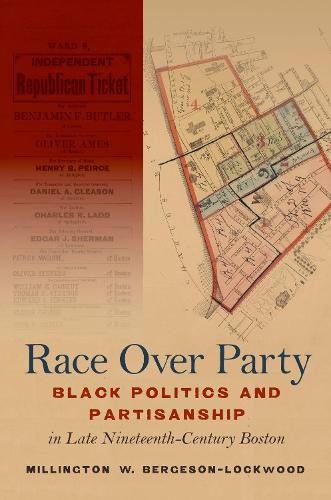Readings Newsletter
Become a Readings Member to make your shopping experience even easier.
Sign in or sign up for free!
You’re not far away from qualifying for FREE standard shipping within Australia
You’ve qualified for FREE standard shipping within Australia
The cart is loading…






In late-nineteenth-century Boston, battles over black party loyalty were fights over the place of African Americans in the post-Civil War nation. In his fresh in-depth study of black partisanship and politics, Millington Bergeson-Lockwood demonstrates that party politics became the terrain upon which black Bostonians tested the promise of equality in America’s democracy. Most African Americans remained loyal Republicans, but Race over Party highlights the actions and aspirations of a cadre of those who argued that the GOP took black votes for granted and offered little meaningful reward for black support. These activists branded themselves
independents,
forging new alliances and advocating support of whichever candidate would support black freedom regardless of party.
By the end of the century, however, it became clear that partisan politics offered little hope for the protection of black rights and lives in the face of white supremacy and racial violence. Even so, Bergeson-Lockwood shows how black Bostonians’ faith in self-reliance, political autonomy, and dedicated organizing inspired future generations of activists who would carry these legacies into the foundation of the twentieth-century civil rights movement.
$9.00 standard shipping within Australia
FREE standard shipping within Australia for orders over $100.00
Express & International shipping calculated at checkout
In late-nineteenth-century Boston, battles over black party loyalty were fights over the place of African Americans in the post-Civil War nation. In his fresh in-depth study of black partisanship and politics, Millington Bergeson-Lockwood demonstrates that party politics became the terrain upon which black Bostonians tested the promise of equality in America’s democracy. Most African Americans remained loyal Republicans, but Race over Party highlights the actions and aspirations of a cadre of those who argued that the GOP took black votes for granted and offered little meaningful reward for black support. These activists branded themselves
independents,
forging new alliances and advocating support of whichever candidate would support black freedom regardless of party.
By the end of the century, however, it became clear that partisan politics offered little hope for the protection of black rights and lives in the face of white supremacy and racial violence. Even so, Bergeson-Lockwood shows how black Bostonians’ faith in self-reliance, political autonomy, and dedicated organizing inspired future generations of activists who would carry these legacies into the foundation of the twentieth-century civil rights movement.